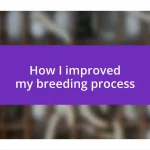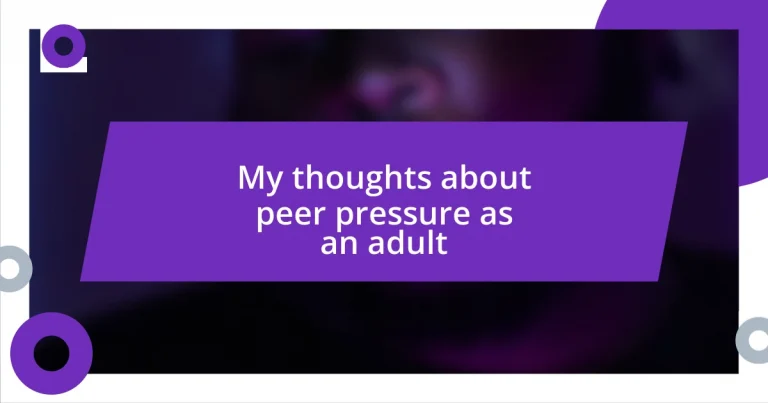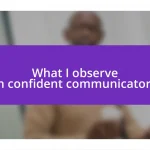Key takeaways:
- Peer pressure persists into adulthood, often manifesting subtly through social dynamics, workplace expectations, and familial influences.
- Effective coping strategies include knowing personal values, practicing assertiveness, setting boundaries, and maintaining supportive relationships.
- Peer pressure can lead to personal growth, motivating individuals to pursue new opportunities, set higher goals, and develop resilience in the face of challenges.
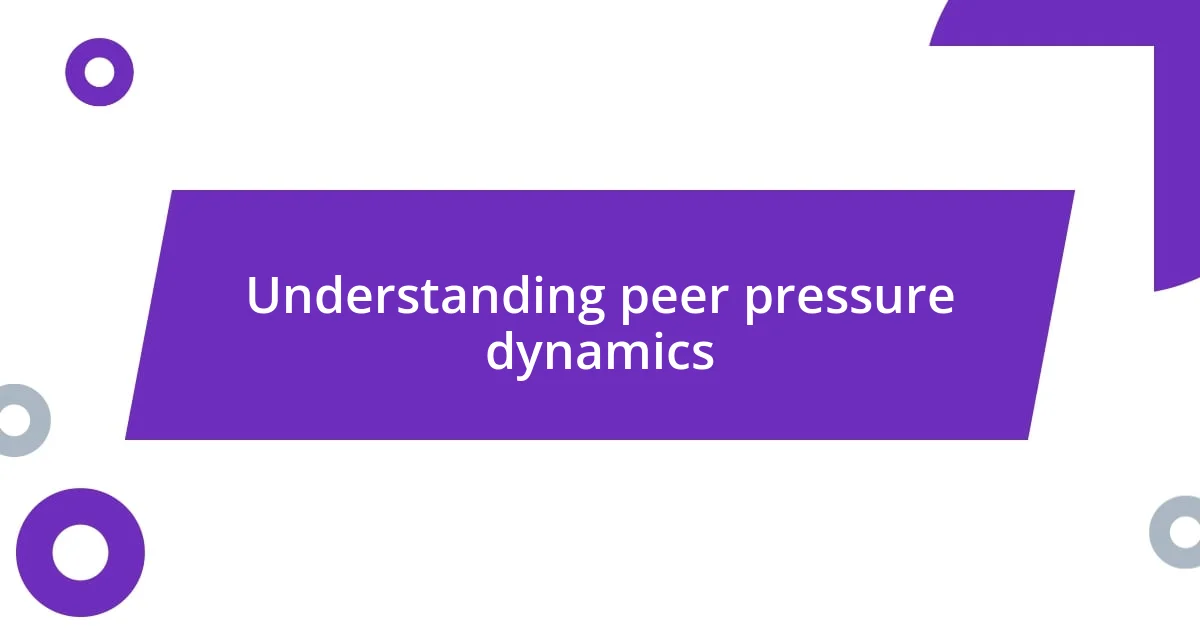
Understanding peer pressure dynamics
Peer pressure, I’ve found, isn’t just a teenage phenomenon; it evolves as we grow. As adults, we encounter it in various forms – be it at work, in social gatherings, or even within our family circles. I remember the time I felt compelled to join in on group dinners that didn’t align with my budget, purely to fit in with colleagues. Have you ever felt that tug from friends or associates to make choices you weren’t entirely comfortable with?
What’s fascinating about peer pressure is its subtlety. Unlike the overt pressure of youth, adult pressure often disguises itself as encouragement or camaraderie. It’s a gentle nudge that can lead to significant choices, like accepting a job offer solely because friends have deemed it an ‘excellent opportunity.’ I found myself reflecting on how easily my decisions could bend under the influence of others’ opinions.
Emotions play a pivotal role in this dynamic, don’t you think? I’ve felt a mix of anxiety and excitement when wanting to please others, which often clouds judgment. It’s crucial to recognize that our self-worth shouldn’t hinge on external validation. When I started prioritizing my values over others’ expectations, I discovered a newfound freedom in making choices that truly resonated with who I am.
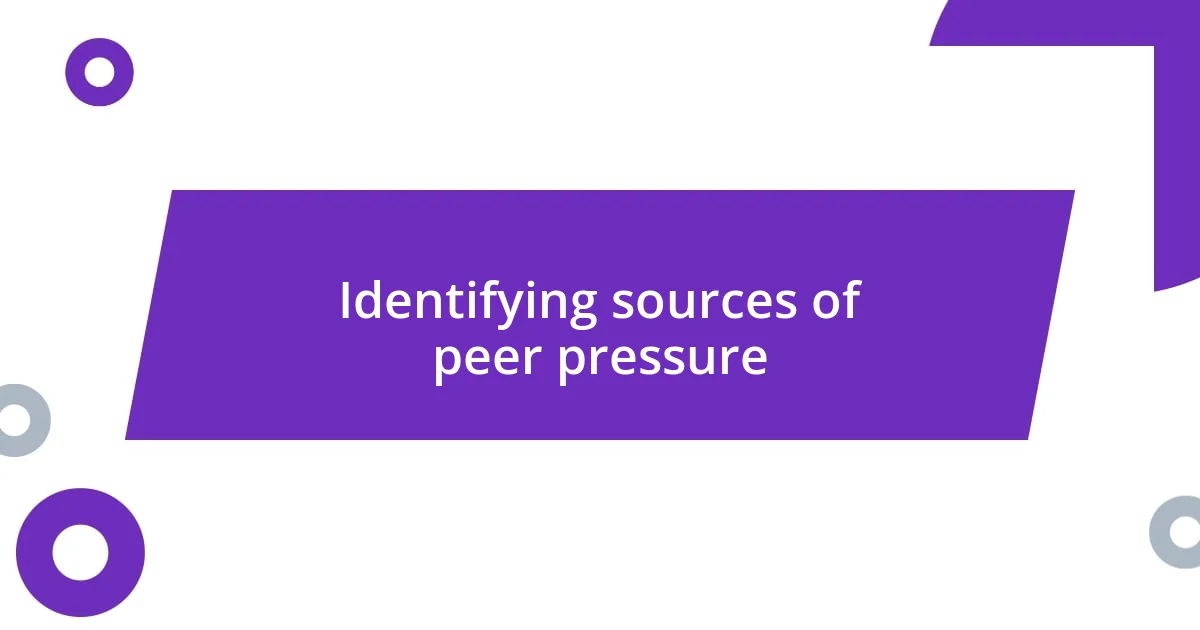
Identifying sources of peer pressure
Identifying sources of peer pressure can be tricky, especially as adults. I often find that social media has become a significant source of influence. When I scroll through my feed, I sometimes feel the unspoken pressure to adhere to certain lifestyles or trends, as if everyone else is living the “ideal” life. Have you experienced that urge to keep up with what you see online?
Workplaces are another major source. There are moments when colleagues’ choices, like after-work happy hours or networking events, create an environment where saying “no” feels daunting. I remember a time when I felt pressured to stay late for an event, even when I had other obligations. Reflecting on that experience made me realize how easily we can prioritize group approval over our personal needs.
Family pressures shouldn’t be overlooked either. I often struggle with familial expectations regarding career paths and life choices. It’s like a silent conversation where dismissing their suggestions feels like turning my back on tradition. A specific instance comes to mind when I was hesitant about my job change, but every family gathering seemed to amplify the pressure to conform. Recognizing these varied sources of peer pressure really helps in navigating adult social dynamics more mindfully.
| Source of Peer Pressure | Personal Experience |
|---|---|
| Social Media | Feeling the urge to conform to trends while scrolling through my feed. |
| Workplace | Feeling pressured to attend events despite personal obligations. |
| Family | Struggling with familial expectations around career and life choices. |
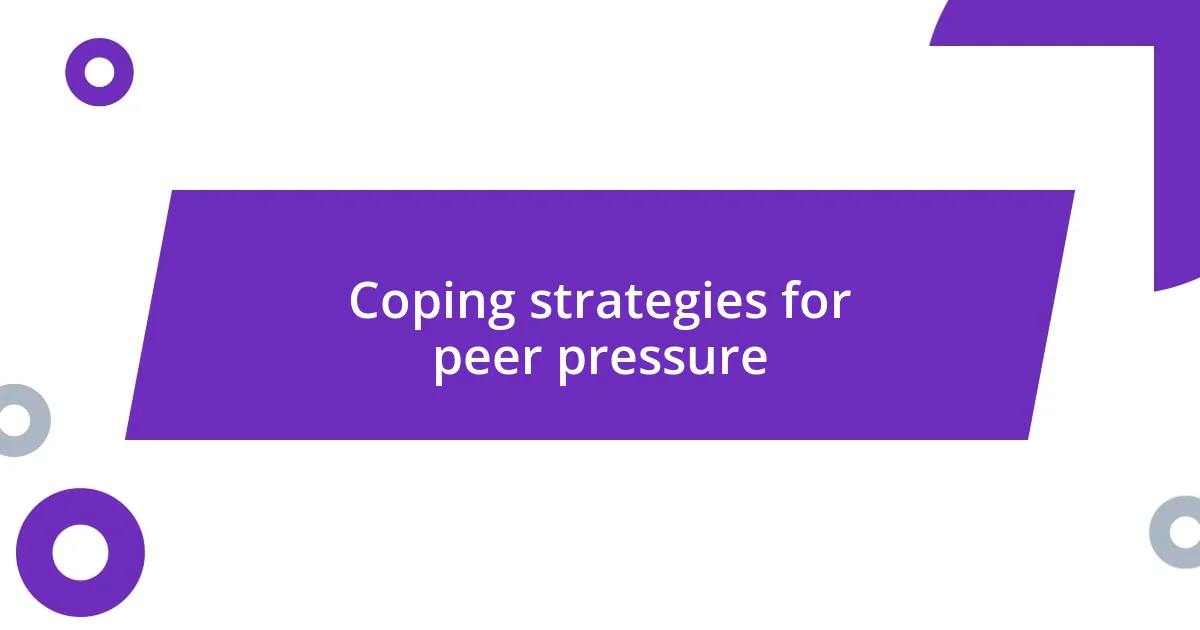
Coping strategies for peer pressure
Coping with peer pressure as an adult requires a blend of self-awareness and assertiveness. I remember a time when my friends encouraged me to invest in a lifestyle brand I wasn’t comfortable with. Instead of going along, I took a step back to assess my financial situation. This moment taught me the value of prioritizing my own comfort and financial goals over others’ opinions.
Here are some strategies that have worked for me:
- Know Your Values: Regularly reflect on what truly matters to you, which helps ground your decisions.
- Practice Saying No: Whether it’s declining an invitation or resisting a suggestion, “no” can become a powerful tool.
- Surround Yourself with Supportive People: Build relationships with those who respect your choices, creating a positive environment.
- Set Boundaries: Clearly communicate what you’re comfortable with regarding commitments or financial decisions.
- Reflect on Past Experiences: Look back on situations where you felt pressured; learning from them can guide current decisions.
Second, embracing assertiveness can transform how you handle peer pressure moments. I recall a gathering where everyone was ordering cocktails, but I opted for sparkling water. While I felt a mix of nervousness and relief, it was empowering to prioritize my health goals over fitting in. This gave me confidence, encouraging others to respect my choices.
It’s essential to have coping mechanisms in place when faced with peer pressure. I’ve found that approaching each situation with a clear head can make all the difference. Developing a personal mantra, like “I choose what’s best for me,” can reinforce your mindset when confronting peer influences.
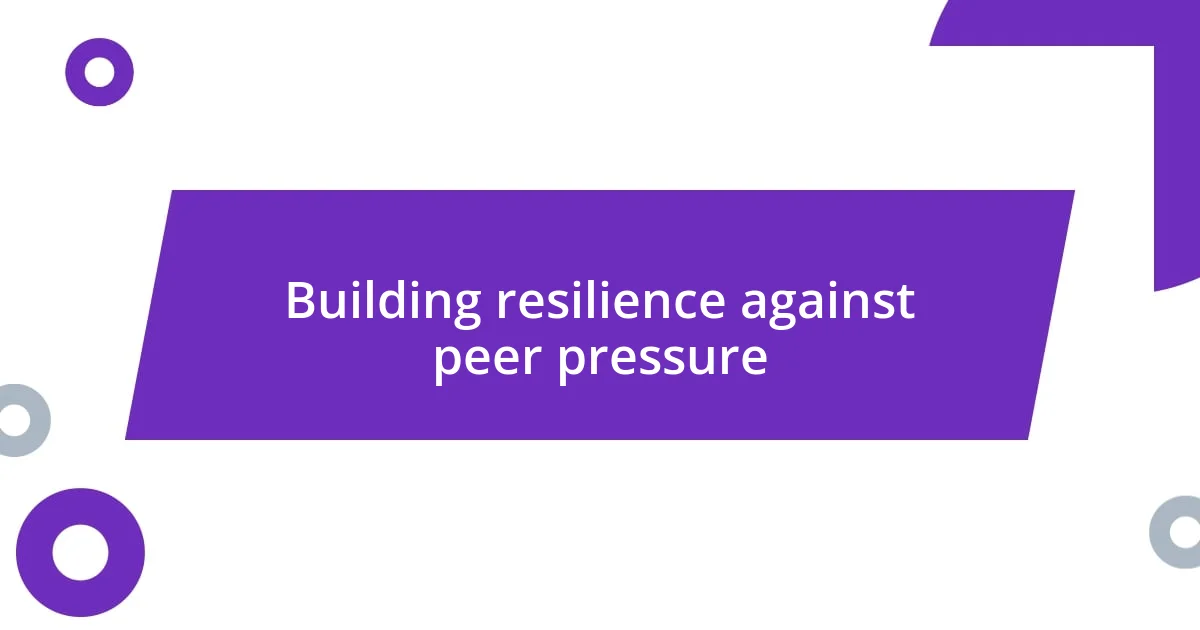
Building resilience against peer pressure
Building resilience against peer pressure is an ongoing journey, and I’ve learned that the first step is really about knowing myself. There have been times when I felt the need to impress others, maybe at a party or a social gathering. I once found myself sharing an opinion just to fit in, even though I felt uneasy about it. This experience pushed me to reflect on my beliefs and prioritize authenticity over approval.
It’s vital to create a personal toolkit for those challenging moments. For example, I began practicing assertive responses with friends, rehearsing how to decline activities that didn’t resonate with my values. During one memorable occasion, I confidently turned down a pricey dinner invitation. That decision not only saved me money but also reaffirmed my self-worth, showing me that real friends support your choices, even if they differ from their own.
Lastly, I often remind myself of the power of inner dialogue. When faced with peer pressure, I ask myself, “Is this choice aligned with who I am?” This quick check-in has helped me avoid decisions I’d later regret. I encourage you to consider what affirmations resonate with you. What can you say to yourself to strengthen your resolve amidst external influences? This reflective practice can truly build your resilience against peer pressure over time.
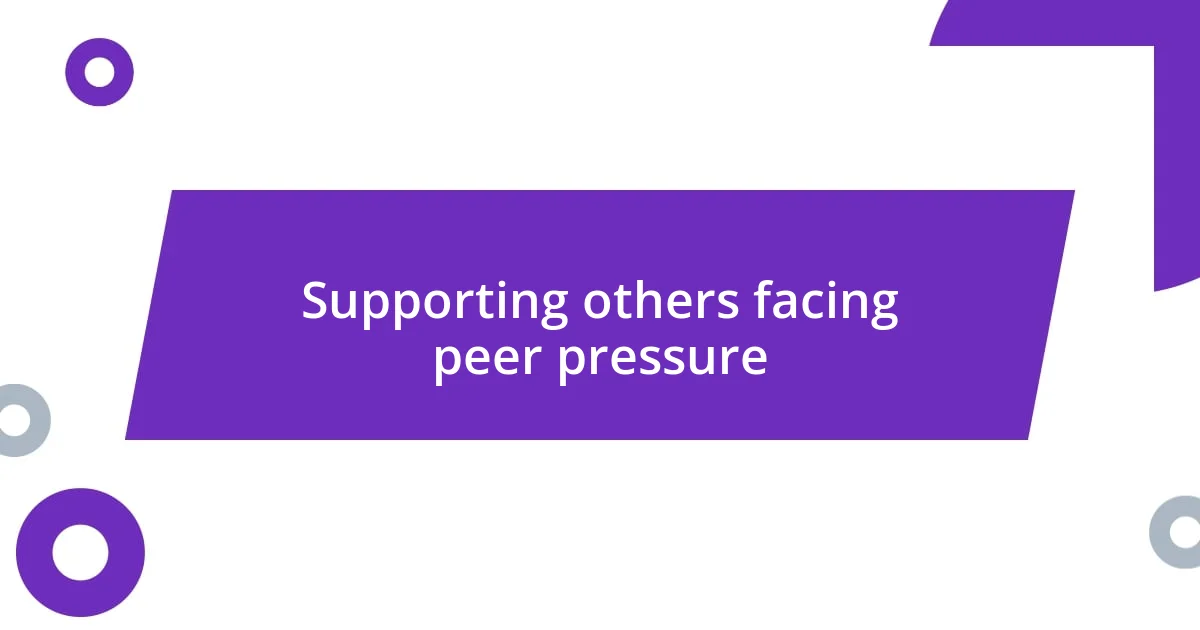
Supporting others facing peer pressure
Supporting friends who are facing peer pressure is crucial. I remember a friend once reached out to me, feeling uneasy about attending a lavish party that didn’t align with her values. I listened to her concerns and encouraged her to trust her instincts. This simple act of support reminded her that she wasn’t alone in navigating the often murky waters of social expectations.
Sometimes, just being there to help someone articulate their feelings can make a big difference. I recall enjoying a cup of coffee with a colleague who felt pressured to adopt a particular lifestyle that didn’t resonate with her. By helping her explore the pros and cons, she realized it wasn’t her path. It felt rewarding to play a part in her decision-making process, showcasing the strength in authenticity.
Also, it’s vital to create an environment where individuals can share their struggles openly. Once, I organized a small gathering with friends where we all discussed our challenges with peer pressure. Sharing our experiences not only fostered understanding but also built a supportive community. Have you ever tried something similar? Seeing others find the courage to be true to themselves was deeply moving and reinforced the idea that solidarity can empower us to stand firm in our choices.
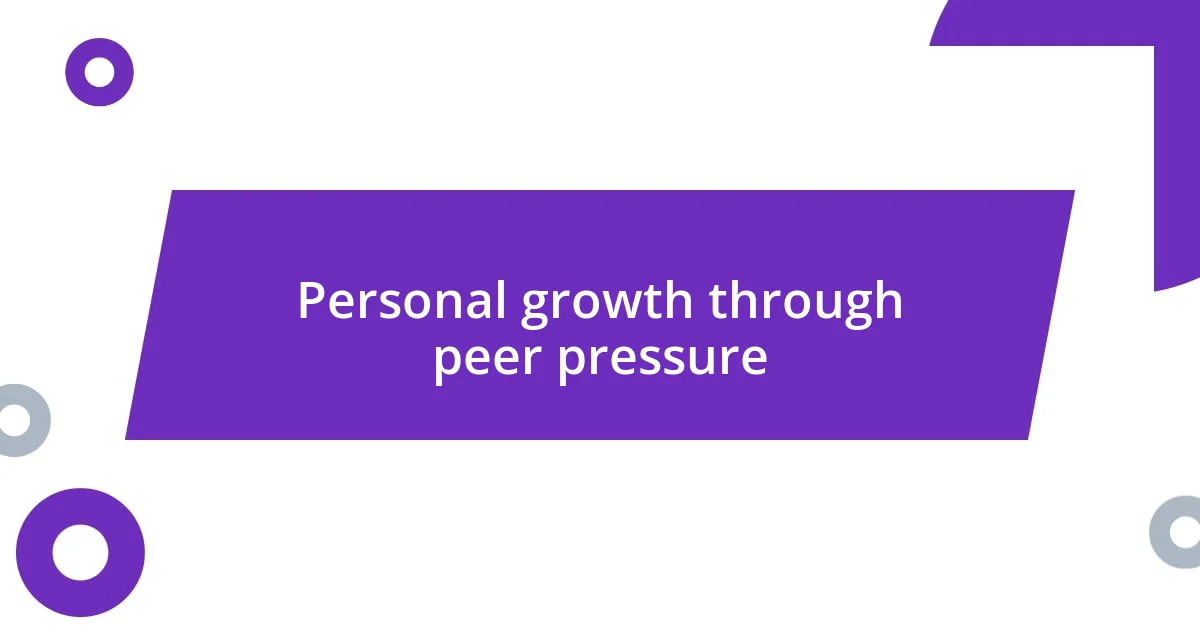
Personal growth through peer pressure
Peer pressure can be a surprising catalyst for personal growth. I recall a time when I was encouraged by a close friend to pursue a new career opportunity, one that initially intimidated me. I hesitated, worried about failing or disappointing others, but ultimately took the plunge—and it turned out to be one of the best decisions of my life. Have you ever found that an outside push led you to discover strengths you didn’t know you had?
Sometimes, peer pressure can lead us to set higher goals for ourselves. I distinctly remember a fitness challenge where my friends encouraged everyone to commit to healthier lifestyles. Their enthusiasm motivated me to join in, and I not only improved my health but also built lasting friendships in the process. Isn’t it interesting how surrounding ourselves with ambitious people can elevate our aspirations?
Navigating peer pressure also taught me about resilience and adaptability. Once, I faced criticism for trying something unconventional in my career—an approach that my peers were skeptical of. Despite the initial pushback, I embraced their doubts as feedback rather than discouragement. It spurred me to refine my ideas and ultimately led to unforeseen success. Have you experienced a moment where you turned pressure into a stepping stone rather than a stumbling block? That shift in perspective is powerful.


